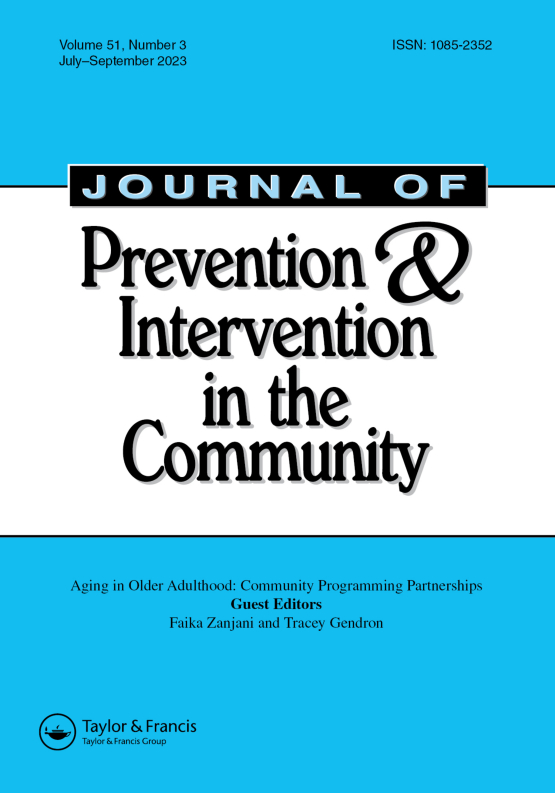Submit a Manuscript to the Journal
Journal of Prevention & Intervention in the Community
For a Special Issue on
Advocacy in Service-Learning Pedagogy
Manuscript deadline

Special Issue Editor(s)
Guest Co-Editor Roger N. Reeb, PhD,
University of Dayton
rreeb1@udayton.edu
Guest Co-Editor Tia N. Turner, MA, TLLP,
Wayne State University
turner.tia@wayne.edu
Editor-in-Chief Judah Viola, PhD,
National Louis University
Judah.Viola@nl.edu
Advocacy in Service-Learning Pedagogy
The Journal of Prevention & Intervention in the Community (JPIC), in print since 1995, provides professionals with up-to-date information on effective programs for community intervention and prevention. With an emphasis on mental health and human services, JPIC is of interest to community researchers, healthcare and helping professionals considering new approaches to their practice, clinical supervisors, education specialists, and administrators in human services. JPIC is published by Taylor & Francis, Inc.
We invite you to submit a manuscript to be considered in this themed issue (Advocacy in Service-Learning Pedagogy). After consulting numerous definitions of service-learning pedagogy in the literature (e.g., Bringle et al., 2016) and websites of numerous colleges and universities, we provide the following working definition:
Service-learning pedagogy connects academic learning, experiential learning, and community engagement/service through structured reflection. Service-learning is co-creative and participatory, with an emphasis on reciprocity, as students, instructors, and community members (e.g., staff of social agencies) collaborate to: define a community issue (i.e., a challenge, an asset-building idea, a problem/deficit); plan and implement service activities revolving around the community issue; and evaluate the array of outcomes for the community and the students. Students regularly reflect upon service activities to enhance their understanding of content of the course(s), their comprehension of the discipline(s) (or transdisciplinary connections), as well as their academic learning, civic development, and personal growth.
In general, there are four overlapping types of service-learning: direct, indirect, research, and advocacy. Many projects incorporate multiple types of service-learning, but this special themed issue focuses primarily on advocacy service-learning. After consulting definitions of advocacy in the literature (e.g., Cohen et al., 2021), we provide the following definition:
Advocacy refers to social or political activities that an individual (or group) engages in to inform or influence community members (including decision-makers) on behalf of a vulnerable group or in support of a cause/initiative to address local, societal, and/or global concerns and to promote systemic change for the common good. Advocacy activities occur at different (or multiple) ecological levels (e.g., person, family, neighborhood, community, national, international/global) or sociopolitical systems (political, economic, and social systems). Citizen participation is central, with citizens representing multiple perspectives contributing to problem or goal definition, planning, decision-making, implementation of interventions/preventions or research, and dissemination of information.
Advocacy in service-learning pedagogy is illustrated in Mitchell’s (2008) work in critical service-learning, which she defines as follows:
There is an emerging body of literature advocating a “critical” approach to community service-learning with an explicit social justice aim. A social change orientation, working to redistribute power, and developing authentic relationships are most often cited in the literature as points of departure from traditional service-learning (p. 50). Critical service-learning programs encourage students [to be] agents of change [and to] use the experience of service to address…injustice in communities (p. 51).
We solicit manuscripts reporting original empirical research on advocacy in service-learning initiatives. We have a preference for quantitative or mixed-methods (quantitative/qualitative) research, but we will consider manuscripts presenting rigorous qualitative research, such as projects using well-established systematic data analytic approaches (e.g., grounded theory, phenomenological analysis) and other rigorous strategies (e.g.., inter-rater or inter-coder reliability). Manuscripts on a range of topics will be considered. Here are examples: (a) Service-learning advocacy projects focused on vulnerable populations, social justice or human rights issues, or climate change; (b) Service-learning advocacy initiatives within the context of a long-term participatory community action research project; (c) New psychometric instruments to assess changes in agency that occur with advocacy interventions/training, with agency referring to such concepts as self-efficacy (and/or collective efficacy) and empowerment (individual or collective empowerment); (d) Service-learning advocacy initiatives using scaffolding of courses (Bringle et al., 2023) across semesters so that subsequent courses can build upon the initiative; (e) Service-learning advocacy initiatives with an ecological perspective, such as transdisciplinary projects (e.g., students from different disciplines working as a team to provide a holistic advocacy approach), projects incorporating multiple perspectives from community partners, or projects with ecological approaches to assess community or student outcomes.
If you wish to submit a manuscript to be considered for this JPIC themed issue, please submit the manuscript (MS Word Document) as soon as possible but no later than September 30th 2025 using this link. Please be sure that you are submitting the manuscript for this specific issue (Advocacy in Service-Learning Pedagogy).
For questions about the special issue, contact both Guest Co-Editors: Roger N. Reeb, PhD (rreeb1@udayton.edu) and Tia N. Turner, MA (turner.tia@wayne.edu). Direct all inquiries about JPIC to the Editor-in-Chief: Judah Viola, PhD (Judah.Viola@nl.edu).
